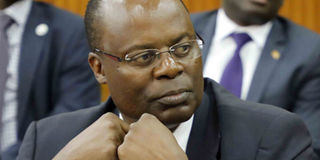Police force journalists to disclose sources

The journalists were asked about how they sourced the stories about deputy governor, Mr Louis Kasekende (Pictured), and other Bank of Uganda officials. FILE PHOTO
What you need to know:
- Section 38 of the Press and Journalist Act on the protection of source of information states that “a journalist shall not be compelled to disclose the source of his or her information except with the consent of the person who gave him or her the information or on an order of a court of law.”
Kampala. Police have demanded four of five editors for online publications who appeared at the Directorate of Criminal Investigations (CID) to reveal the sources behind stories on the Bank of Uganda deputy governor after they published photographs of his alleged buildings and bank accounts.
Spy Reports co-proprietor Raymond Wamala and the publication’s former editor, Mr Bob Atwine, alongside Mr Andrew Irumba, who runs Spy Uganda, were interrogated yesterday at CID Headquarters Kibuli before their police bonds were extended to February 18.
Mr Richard Wanambwa of Eagle Online was also released on police bond and he is to reappear today at CID headquarters Kibuli.
Mr John Njoroge, formerly editor of CEO Magazine, again failed to show up at police.
Mr Wamala said he was asked about how he sourced the stories about deputy governor, Mr Louis Kasekende, and other Bank of Uganda officials.
“The detectives wanted to know who gave us the information we published. We can’t do that because the law requires as to protect our sources. We can’t be compelled to disclose our sources except with the consent of court or by the source,” Mr Wamala said.
What law says
Section 38 of the Press and Journalist Act on the protection of source of information states that “a journalist shall not be compelled to disclose the source of his or her information except with the consent of the person who gave him or her the information or on an order of a court of law.”
CID spokesperson Vincent Ssekatte said the journalists were given their freedom after committing that they will not disrupt police investigations.
“So far the investigations reveal that their actions were intended to defame Bank of Uganda officials. We are still looking at other offences and we shall interrogate them after we have examined the evidence we have got,” Mr Ssekatte said yesterday.
This is the second time Mr Wamala, Mr Atwine and Mr Irumba have appeared at CID Kibuli for interrogation.
Last Friday, detectives confiscated their phones. It is alleged that between October 2018 and January 2019, the five online publishers published photographs of property they claimed to be owned by Mr Kasekende.
They also published money transfers they alleged to have been done by Mr Kasekende, allegations he has consistently denied.
The alleged leaks followed the sale of Crane Bank to dfcu. Investigators suspect that the journalists were being used by owners of the defunct Crane Bank to tarnish the image of Mr Kasekende.




